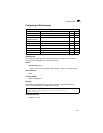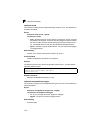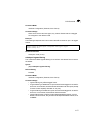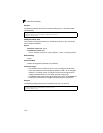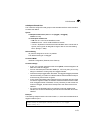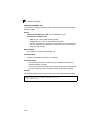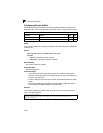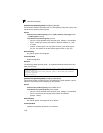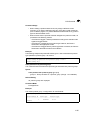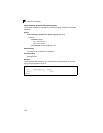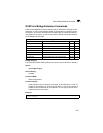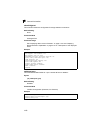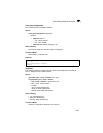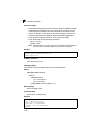
VLAN Commands
4-183
4
show pvlan
This command displays the configured private VLAN.
Command Mode
Privileged Exec
Example
Configuring Protocol-based VLANs
The network devices required to support multiple protocols cannot be easily grouped
into a common VLAN. This may require non-standard devices to pass traffic
between different VLANs in order to encompass all the devices participating in a
specific protocol. This kind of configuration deprives users of the basic benefits of
VLANs, including security and easy accessibility.
To avoid these problems, you can configure this switch with protocol-based VLANs
that divide the physical network into logical VLAN groups for each required protocol.
When a frame is received at a port, its VLAN membership can then be determined
based on the protocol type in use by the inbound packets.
To configure protocol-based VLANs, follow these steps:
1. First configure VLAN groups for the protocols you want to use (page 4-174).
Although not mandatory, we suggest configuring a separate VLAN for each
major protocol running on your network. Do not add port members at this time.
2. Create a protocol group for each protocol you want to assign to a VLAN using
the protocol-vlan protocol-group command (General Configuration mode).
3. Then map the protocol for each interface to the appropriate VLAN using the
protocol-vlan protocol-group command (Interface Configuration mode).
Console#show pvlan
Private VLAN status: Enabled
Up-link port:
Ethernet 1/24
Down-link port:
Ethernet 1/1
Ethernet 1/2
Ethernet 1/3
Ethernet 1/4
Console#
Table 4-57. Protocol VLAN Commands
Command Function Mode Page
protocol-vlan protocol-group Create a protocol group, specifying the supported protocols GC 4-184
protocol-vlan protocol-group Maps a protocol group to a VLAN IC 4-184
show protocol-vlan
protocol-group
Shows the configuration of protocol groups PE 4-185
show interfaces
protocol-vlan protocol-group
Shows the interfaces mapped to a protocol group and the
corresponding VLAN
PE 4-186



